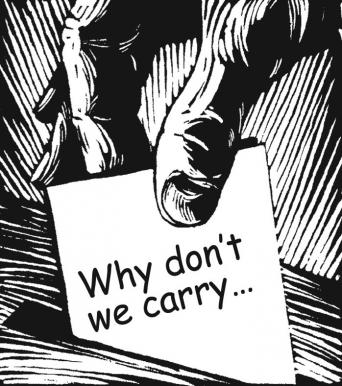
Suggestion Box: The Food Chain Hasn't Been Disrupted (But What If...)
Greetings and thanks for writing. As usual, suggestions and responses may have been edited for brevity, clarity and/or comedy. In addition, no idea, concept, issue, remark, phrase, description of event, word, or word string should be taken seriously. This also applies to the previous sentence.
I’m writing this in the midst of coronavirus shopping days — some of the busiest days our stores have ever had. Lots of things come up in a crisis, one of which is priorities. While we kind of understood the importance of Weavers Way and grocery stores in general before this, it’s interesting to see us officially classified as an “Essential Business.”
The food supply, while seeming to have adequate overall supplies right now (recovering from a recent “panic buying” period), is also vulnerable to COVID-19. Even though all the soybean, corn, produce, chicken and many other commodities are still being produced, and even though there is a lot of mechanization in the supply chain, it’s still dependent on humans. Humans still help plant, pick, process, package and transport food before it gets to the consumer.
The supply chain is not really set up for disruptions like this, especially some of the support industries. That “global supply chain” and “just-in-time ordering” you may have read about in business publications works when things are normal, but when a pallet jack or truck part is needed and repair companies are used to only having a few parts available based on history, but suddenly parts from China and Mexico are months away instead of weeks, you can see the potential ripple effect. Most food products depend on both people and machinery somewhere along the line, so any disruption to either can affect supply. So far so good, though; as of the end of March, our suppliers are not telling us they are predicting long–term shortages.
When the restrictions first hit, I got to wondering, “What would I do if I couldn’t get food?” Eat grass? (Not so much.) Pine bark? (Certain parts, yes.) Forage the neighborhood like a squirrel? It occurred to me I could buy things such as mung beans, lentils, and alfalfa seeds, sprout them, and have some indoor kitchen-grown fresh food in about a week. Then I got curious about what else grows fast and read that radishes, scallions, and lettuce can grow in about a month. Spinach, turnips, beets, zucchini, broccoli, baby carrots, and cucumbers are in the 30-60-day range. Of course, this assumes good growing conditions. If you kept chickens and could keep them fed, you’d have eggs. Could you leave some old food out to attract flies and eat maggots? Turns out that’s not a good choice.
Time for some survivalist thinking? Joining the “preppers”? Maybe we should all consider some more self-sufficient practices and homesteading when it comes to food, such as the Victory Gardens of the past, when food got short.
suggestions and responses:
s: “I eat gluten free. I have tried the Amaranth Bakery GF products and dislike them intensely! They have a very peculiar aftertaste. Might you consider doing business with Taffets? Or another company? Thank you!”
r: (Jenna MA) Sorry to hear you were dissatisfied with Amaranth products. We currently get deliveries from Taffets every Saturday. We offer their biscotti, cookies, and bread. You can always place a pre-order if you want us to put a specific product aside for you before it hits the shelf. I am also currently hunting for another gluten-free bakery to bring in, so stay tuned…
s: “Can we get Trickling Springs milk in glass back?”
r: (Norman) Nope, Trickling Springs has gone out of business, and it’s a bit of a wild story, with the local press reporting the owners being accused of defrauding investors of more than $7 million.
s: “Can we stock ‘Normal Salt’?”
r: (Matt MA) Unfortunately, salt, like people, immediately becomes abnormal in Mt. Airy, so there is no way to have “normal” anything.
s: “To allow the Co-op to make more deliveries without increasing staffing, has the Co-op considered futuristic technologies like time travel, teleporting, warping space, or just freeze-drying everything to be rehydrated after delivery?”
r: (Norman) We looked into the first three, but it turns out Amazon already had patents. That leaves freeze-drying as the most viable option, which we are testing on some popular and heavy and voluminous items, like seltzer.
s: “With schools closed, can the MA and CH stores now sell beer?”
r: (Norman) No, as all alcohol production is now geared toward producing hand sanitizer. This virus will be a sobering experience.
s: “I’ve been practicing social distancing but am feeling sad with the lack of close human interaction, especially hugs.”
r: (Norman) Our government forgot to include the corollary distancing that should have accompanied social distancing to maintain psychological health: emotional distancing. Traditionally and stereotypically, many men are naturally good at this, so just model them as a form of emotional distance training.
